外研版(2019)选择性必修第一册Unit 2 Onwards and Upwards Starting out & Understanding ideas 课件(共40张PPT)
文档属性
| 名称 | 外研版(2019)选择性必修第一册Unit 2 Onwards and Upwards Starting out & Understanding ideas 课件(共40张PPT) |
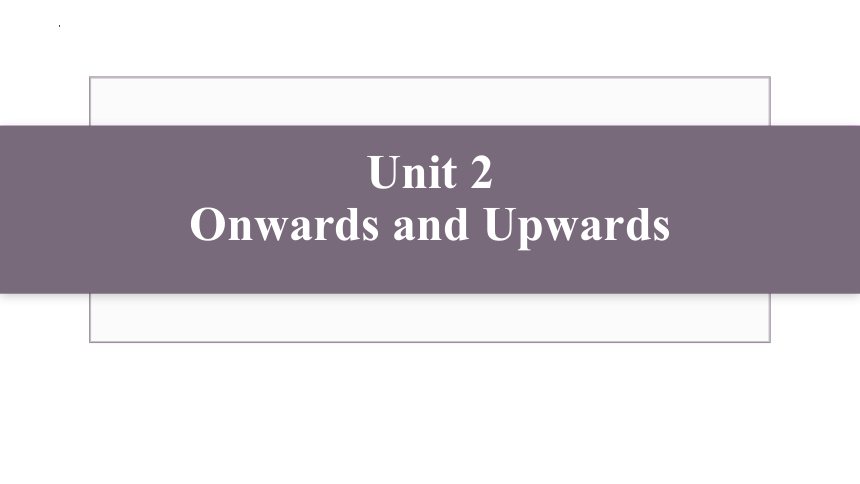
|
|
| 格式 | pptx | ||
| 文件大小 | 29.2MB | ||
| 资源类型 | 教案 | ||
| 版本资源 | 外研版(2019) | ||
| 科目 | 英语 | ||
| 更新时间 | 2024-02-18 21:28:09 | ||
图片预览

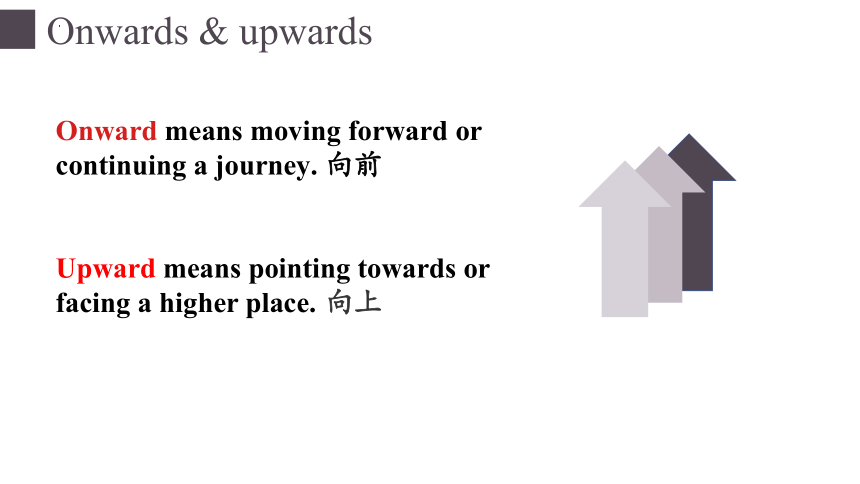

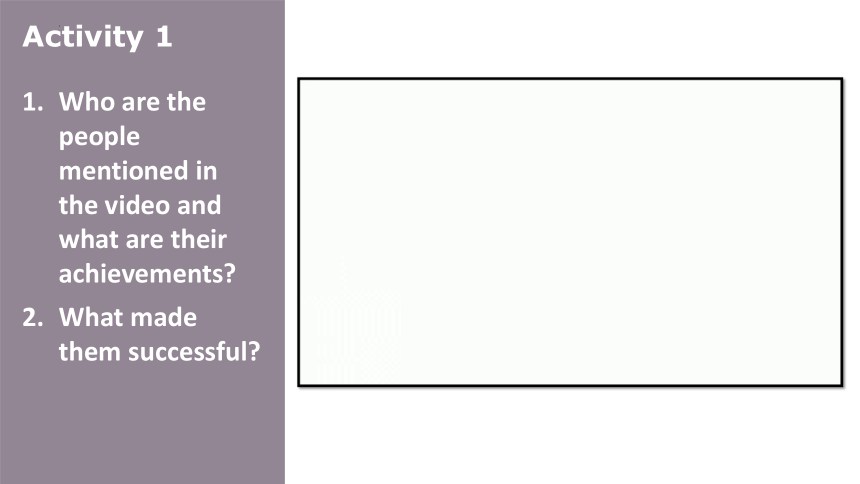
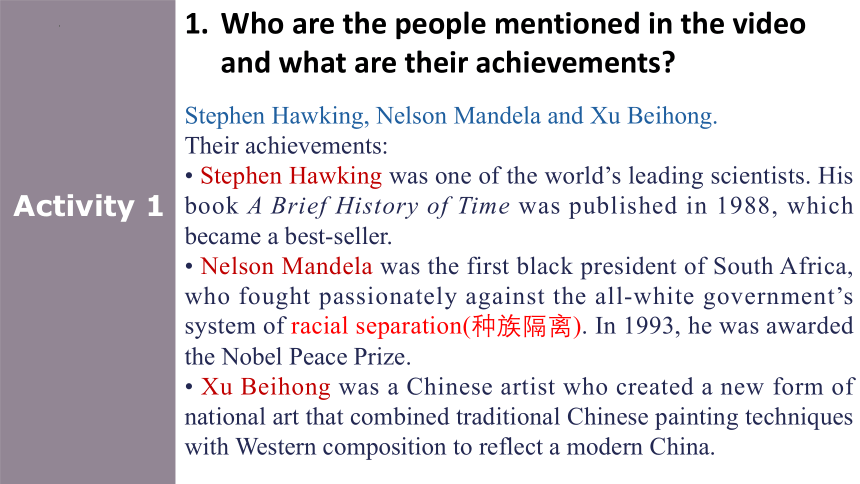
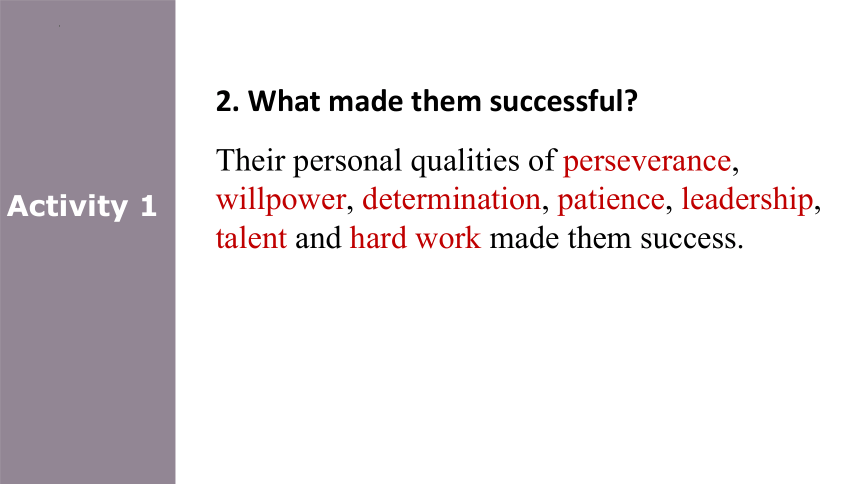
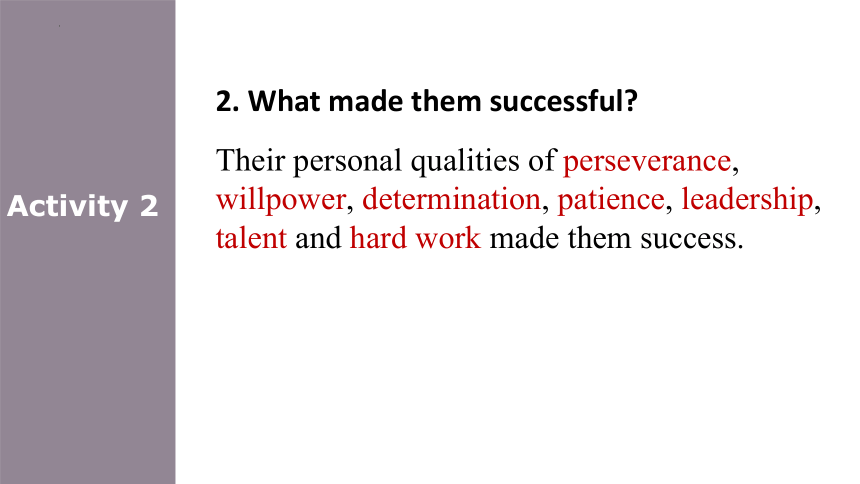
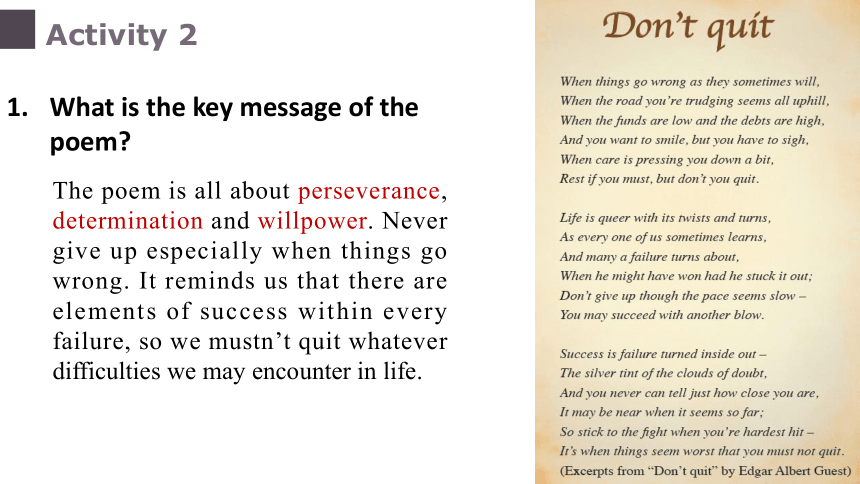
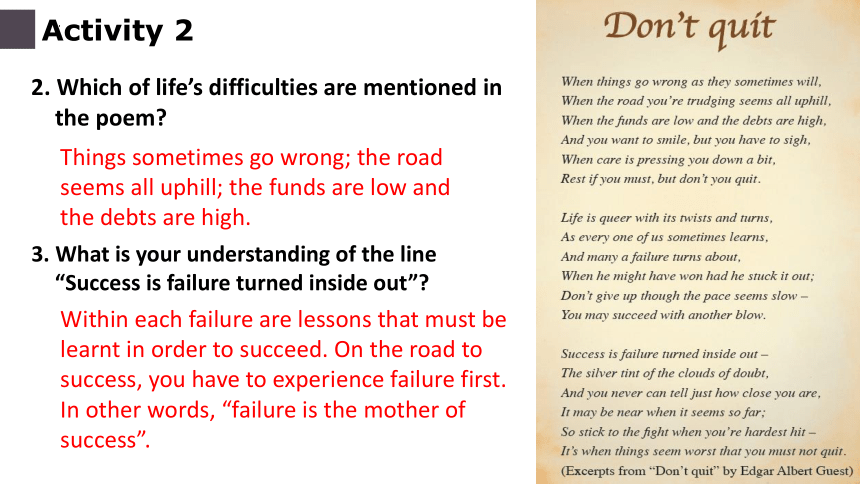
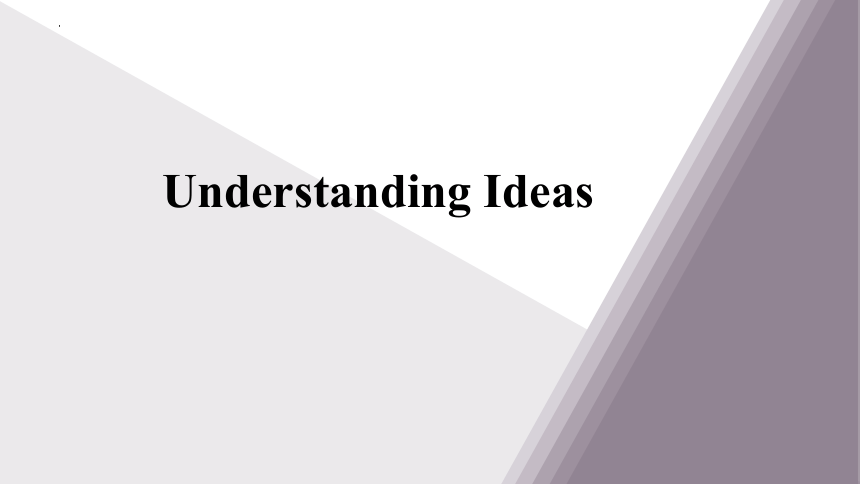
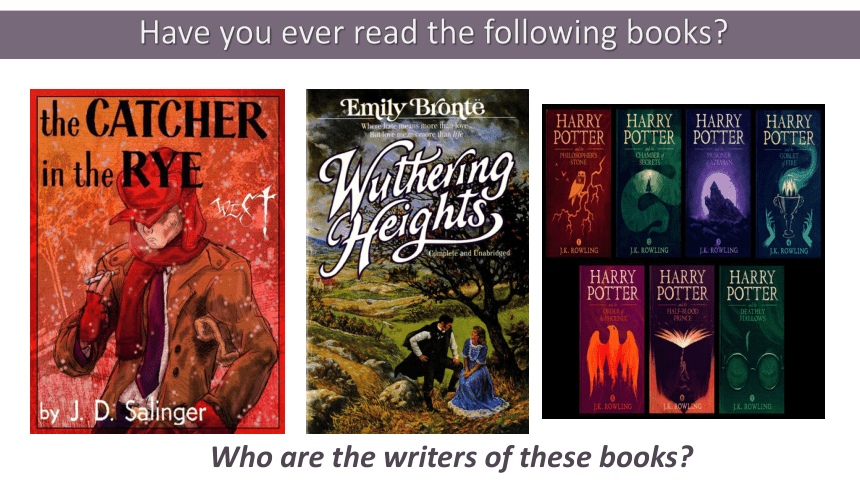
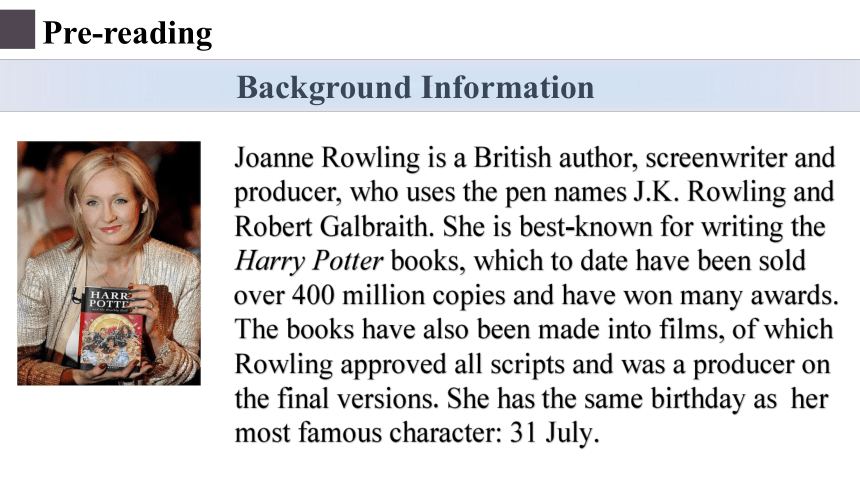
文档简介
(共40张PPT)
Unit 2
Onwards and Upwards
Onwards & upwards
Onward means moving forward or continuing a journey. 向前
Upward means pointing towards or facing a higher place. 向上
Starting Out
Who are the people mentioned in the video and what are their achievements
What made them successful
Activity 1
Activity 1
Who are the people mentioned in the video and what are their achievements
Stephen Hawking, Nelson Mandela and Xu Beihong.
Their achievements:
Stephen Hawking was one of the world’s leading scientists. His book A Brief History of Time was published in 1988, which became a best-seller.
Nelson Mandela was the first black president of South Africa, who fought passionately against the all-white government’s system of racial separation(种族隔离). In 1993, he was awarded the Nobel Peace Prize.
Xu Beihong was a Chinese artist who created a new form of national art that combined traditional Chinese painting techniques with Western composition to reflect a modern China.
Activity 1
Activity 1
2. What made them successful
Their personal qualities of perseverance, willpower, determination, patience, leadership, talent and hard work made them success.
Activity 1
Activity 1
2. What made them successful
Their personal qualities of perseverance, willpower, determination, patience, leadership, talent and hard work made them success.
Activity 2
Activity 2
What is the key message of the poem
The poem is all about perseverance, determination and willpower. Never give up especially when things go wrong. It reminds us that there are elements of success within every failure, so we mustn’t quit whatever difficulties we may encounter in life.
Activity 2
2. Which of life’s difficulties are mentioned in the poem
Things sometimes go wrong; the road seems all uphill; the funds are low and the debts are high.
3. What is your understanding of the line “Success is failure turned inside out”
Within each failure are lessons that must be learnt in order to succeed. On the road to success, you have to experience failure first. In other words, “failure is the mother of success”.
Understanding Ideas
Have you ever read the following books
Who are the writers of these books
Background Information
Pre-reading
Joanne Rowling is a British author, screenwriter and producer, who uses the pen names J.K. Rowling and Robert Galbraith. She is best-known for writing the Harry Potter books, which to date have been sold over 400 million copies and have won many awards. The books have also been made into films, of which Rowling approved all scripts and was a producer on the final versions. She has the same birthday as her most famous character: 31 July.
Background Information
Pre-reading
Jerome David Salinger (1919-2010) was an American writer known for his widely-read novel The Catcher in the Rye. Following his early success publishing short stories and The Catcher in the Rye, Salinger led a very private life for more than a half-century. He published his final original work in 1965 and may have written and hidden several unpublished works.
Background Information
Pre-reading
Emily Jane Bronte (1818-1848) was an English writer who wrote under the pen name Ellis Bell. She is best known for her one novel, Wuthering Heights, today a classic of English literature. Emily had three siblings who reached adulthood: her sisters, Charlotte and Anne, and her brother, Branwell. She had to pay to have her poetry published.
Match each writer to his/her work.
Pre-reading
Prediction
“We regret to inform you ... ”
What do you think it means to a writer
Read the first paragraph to check your prediction.
All of these highly successful writers have previously faced rejection.
How many parts are there in the passage and what are they
Introduction
Conclusion
Example 1
J.K. Rowling
Example 2
J.D. Salinger
Example 3
Bront sisters
While-
reading
Choose another suitable title for the passage and give your reasons.
While-
reading
While-
reading
Read the passage and finish the table
While-
reading
Example 1
Writer: ____________
Best Known for: ____________
Experience of rejection:
______________________________________________________________________________________________________
Eventual outcome: _________________________________
J.K. Rowling
Harry Potter
She was told that his book was too difficult and too long for
children and it was rejected twelve times by publishers.
Harry Potter became a global success.
Introduction
A lot of successful writers have previously faced rejection.
While-
reading
Example 2
Writer: ____________
Best Known for: ____________________
Experience of rejection:
_____________________________________________
Eventual outcome: ____________________________________________________________________________________
J.D. Salinger
The Cacther in the Rye
He received criticism and rejections from several
publishers
The Catcher in the Rye became an immediate
best-seller after it was published.
While-
reading
Example 3
Writer: _____________
Best Known for: _________________________________________
Experience of rejection:
_______________________________________________________________________________________________________________________________
Eventual outcome: ________________________________________________________
Bronte sisters
Jane Eyre, Wuthering Heights and
Agnes Grey
Women were not encouraged to become writers at that time
Their book of poems which they wrote under male names
sold only two copies.
Their novels are regarded as classics of world literature.
While-
reading
Conclusion
Perseverance is the key to success.
Post-
reading
Which title is better Why do you think so
Never Give Up on Your Dreams
The passage is made complete by the way in which
the first sentence is mirrored/echoed by the last sentence.
Failure
“We regret to inform you...”
Success
“We are delighted to inform you...”
Post-
reading
2. Which paragraph does each of the sentences come from Why does the author use them like this within the passage
“We regret to inform you…” comes from the first paragraph.
“We are delighted to inform you…” comes from the last paragraph.
The author intends to begin with the negative theme of rejection, but then reveal that perseverance can turn a bad beginning into a good ending. Or rather, success comes to those who don’t give up.
In addition, the passage is made complete by the way in which the first sentence is mirrored by the last sentence.
Post-
reading
Do you know any other distinguished person who shares the similar experiences
Think & Share
1 What can you learn from these writers
Stay true to your dreams and never give up.
2 Have you read any books by these writers Recommend one to your classmates.
3 Do you know of any other writer who had similar experiences Share their stories with the class.
4 What words and expressions from the passage have you used to tell these stories
Language points
Para. 1
"We regret to inform you..." These are the words that every writer dreads receiving, but words every writer knows well. The response from a publisher comes back and the writer eagerly opens and reads it, their hearts sinking when they reach that final sentence. You may have spent years giving up your weekends and free time to write your life's work, yet still this is often not enough. Everyone knows that success rarely happens overnight, but perhaps not many know that a lot of highly successful writers have previously faced rejection.
1. dread doing sth 惧怕做某事
2. one’s heart sinks 心情沉重
Para. 2
Take for example J.K.Rowling. When she received her first rejection letter, she decided that it meant she now had something in common with her favourite writers, and stuck it on her kitchen wall. Rowling had spent years surviving on little money, spending all her time writing. When she finally finished her first book, she received comments from publishers along the lines of "too difficult for children", "too long", "Children would not be interested in it".
3. take...for example 以...为例
4. have...in common 有...共同之处
5. survive on 靠...生存
Para. 2
Nevertheless, she persevered. "I wasn't going to give up until every single publisher turned me down, but I often feared that would happen," she later posted. After a total of twelve rejecions, one publisher eventually agreed to print 500 copies of her first book, and as we know, Harry Potter became a global success, with over 400 millon books sold and translated into more than seventy different languages.
6. turn down 拒绝;调小
7. a total of 总数为
Para. 3
All too often writers of great works have had to face criticism along with rejection. J.D.Salinger started writing short stories in high school, but later struggled to get his works published. "We feel that we don't know the central character well enough" was the criticism he received on his manuscript for The Catcher in the Rye. Despite rejections from several publishers, J.D. Salinger refused to give up. Even when serving in the US Army during the Second World War, he carried six chapters of The Catcher in the Rye with him and worked on the novel throughout his war service. When it was eventually published, the book became an immediate best-seller and went on to sell millions and millons of copies.
8. all too aften 太多时候;太过频繁
9. struggle to do sth 努力做某事
Para. 4
Perhaps the overall prize for perseverance should go to three sisters from Victorian England who dreamt of seeing their words in print. This, however, was a time when women were not encouraged to become writers. As the then Poet Laureate, Robert Southey, wrote to one of them:"Literature cannot be the business of a woman's life, and it ought not to be." Nevertheless the sisters didn't stop trying. Their response was to write a book of poems under male names.
10. dream of doing sth 梦想做某事
11. in print 刊印;出版
Para. 4
Even when the book sold only two copies, the sisters still didn't give up. They started writing novels, and today Charlotte Bronte's Jane Eyre, Emily Bront's Watbering Heights and Anne Bronte's Agnes Grey are regarded as classics of world literature. In fact, it's within the pages of Jane Eyre that we can find these words: "I honour endurance, perseverance, industry, talent; because these are the means by which men achieve great ends...
12. give up 放弃
13. be regarded as 被认为是
Para. 5
So, it seems that talent alone isn't enough to guarantee success. While a lot of hard work and a touch of luck play a part, perseverance is the key. Keep trying and eventually you will read the words "We are delighted to inform you..."
14. play a part 起作用
出问题
上坡的
债款;欠债 n.
许多
很遗憾通知你
害怕做...
心情沉重
十分成功的作家
go wrong
go uphill
debt
many a + n (单数)
regret to inform you that....
dread doing
heart sinks
highly successful writers
highly skilled/ highly intelligent
think / speak highly of....
Para 1
Para 2
9. 罗琳为例
10. 拒绝信
11. 把……粘在墙上
12. 以微薄的收入存活
13. 但是
14. 坚持 v. n. adj.
15. 拒绝
16. 总共
17. 500份她的第一本书
a
9. take J.K Rowling for example/as an example
10. rejection letter
11. stick sth. on the wall
12. survive on little money
13. nevertheless, nonetheless, however
14. persevere/persist in doing/with sth.
perseverance persistence
persevering/perseverant persistent
15. turn sb. down
16. a total of
17. 500 copies of her first book
Para 3
18.经常
19. 伟大作品的作家
20. 面对批评与拒绝
21.奋力做……
与……斗争
善恶之争
争取独立的斗争
22. 使作品被发表
23. 服军役
24. 自始至终/贯穿整个时期
18. All too often; more often than not
19. Writers of great works
20. Face/confront criticism
21. struggle to do sth./for sth.
struggle against/with sth.
a struggle between good and evil
a struggle for independence
22. get his works published
23. serve in the army
24. throughout
throughout his writing career/
throughout the contest
Para 4
25. . 应当做...
26. 然而
27. 职责/归...管
28. 用这些方法
25. ought to do
26. nevertheless
27. business mind your own business
stay out of my business
28. by these means
with this method
in this way
Para 5
保证做某事
向某人保证某事
在保修期
guarantee to do
guarantee sb. sth.
be under guarantee
Unit 2
Onwards and Upwards
Onwards & upwards
Onward means moving forward or continuing a journey. 向前
Upward means pointing towards or facing a higher place. 向上
Starting Out
Who are the people mentioned in the video and what are their achievements
What made them successful
Activity 1
Activity 1
Who are the people mentioned in the video and what are their achievements
Stephen Hawking, Nelson Mandela and Xu Beihong.
Their achievements:
Stephen Hawking was one of the world’s leading scientists. His book A Brief History of Time was published in 1988, which became a best-seller.
Nelson Mandela was the first black president of South Africa, who fought passionately against the all-white government’s system of racial separation(种族隔离). In 1993, he was awarded the Nobel Peace Prize.
Xu Beihong was a Chinese artist who created a new form of national art that combined traditional Chinese painting techniques with Western composition to reflect a modern China.
Activity 1
Activity 1
2. What made them successful
Their personal qualities of perseverance, willpower, determination, patience, leadership, talent and hard work made them success.
Activity 1
Activity 1
2. What made them successful
Their personal qualities of perseverance, willpower, determination, patience, leadership, talent and hard work made them success.
Activity 2
Activity 2
What is the key message of the poem
The poem is all about perseverance, determination and willpower. Never give up especially when things go wrong. It reminds us that there are elements of success within every failure, so we mustn’t quit whatever difficulties we may encounter in life.
Activity 2
2. Which of life’s difficulties are mentioned in the poem
Things sometimes go wrong; the road seems all uphill; the funds are low and the debts are high.
3. What is your understanding of the line “Success is failure turned inside out”
Within each failure are lessons that must be learnt in order to succeed. On the road to success, you have to experience failure first. In other words, “failure is the mother of success”.
Understanding Ideas
Have you ever read the following books
Who are the writers of these books
Background Information
Pre-reading
Joanne Rowling is a British author, screenwriter and producer, who uses the pen names J.K. Rowling and Robert Galbraith. She is best-known for writing the Harry Potter books, which to date have been sold over 400 million copies and have won many awards. The books have also been made into films, of which Rowling approved all scripts and was a producer on the final versions. She has the same birthday as her most famous character: 31 July.
Background Information
Pre-reading
Jerome David Salinger (1919-2010) was an American writer known for his widely-read novel The Catcher in the Rye. Following his early success publishing short stories and The Catcher in the Rye, Salinger led a very private life for more than a half-century. He published his final original work in 1965 and may have written and hidden several unpublished works.
Background Information
Pre-reading
Emily Jane Bronte (1818-1848) was an English writer who wrote under the pen name Ellis Bell. She is best known for her one novel, Wuthering Heights, today a classic of English literature. Emily had three siblings who reached adulthood: her sisters, Charlotte and Anne, and her brother, Branwell. She had to pay to have her poetry published.
Match each writer to his/her work.
Pre-reading
Prediction
“We regret to inform you ... ”
What do you think it means to a writer
Read the first paragraph to check your prediction.
All of these highly successful writers have previously faced rejection.
How many parts are there in the passage and what are they
Introduction
Conclusion
Example 1
J.K. Rowling
Example 2
J.D. Salinger
Example 3
Bront sisters
While-
reading
Choose another suitable title for the passage and give your reasons.
While-
reading
While-
reading
Read the passage and finish the table
While-
reading
Example 1
Writer: ____________
Best Known for: ____________
Experience of rejection:
______________________________________________________________________________________________________
Eventual outcome: _________________________________
J.K. Rowling
Harry Potter
She was told that his book was too difficult and too long for
children and it was rejected twelve times by publishers.
Harry Potter became a global success.
Introduction
A lot of successful writers have previously faced rejection.
While-
reading
Example 2
Writer: ____________
Best Known for: ____________________
Experience of rejection:
_____________________________________________
Eventual outcome: ____________________________________________________________________________________
J.D. Salinger
The Cacther in the Rye
He received criticism and rejections from several
publishers
The Catcher in the Rye became an immediate
best-seller after it was published.
While-
reading
Example 3
Writer: _____________
Best Known for: _________________________________________
Experience of rejection:
_______________________________________________________________________________________________________________________________
Eventual outcome: ________________________________________________________
Bronte sisters
Jane Eyre, Wuthering Heights and
Agnes Grey
Women were not encouraged to become writers at that time
Their book of poems which they wrote under male names
sold only two copies.
Their novels are regarded as classics of world literature.
While-
reading
Conclusion
Perseverance is the key to success.
Post-
reading
Which title is better Why do you think so
Never Give Up on Your Dreams
The passage is made complete by the way in which
the first sentence is mirrored/echoed by the last sentence.
Failure
“We regret to inform you...”
Success
“We are delighted to inform you...”
Post-
reading
2. Which paragraph does each of the sentences come from Why does the author use them like this within the passage
“We regret to inform you…” comes from the first paragraph.
“We are delighted to inform you…” comes from the last paragraph.
The author intends to begin with the negative theme of rejection, but then reveal that perseverance can turn a bad beginning into a good ending. Or rather, success comes to those who don’t give up.
In addition, the passage is made complete by the way in which the first sentence is mirrored by the last sentence.
Post-
reading
Do you know any other distinguished person who shares the similar experiences
Think & Share
1 What can you learn from these writers
Stay true to your dreams and never give up.
2 Have you read any books by these writers Recommend one to your classmates.
3 Do you know of any other writer who had similar experiences Share their stories with the class.
4 What words and expressions from the passage have you used to tell these stories
Language points
Para. 1
"We regret to inform you..." These are the words that every writer dreads receiving, but words every writer knows well. The response from a publisher comes back and the writer eagerly opens and reads it, their hearts sinking when they reach that final sentence. You may have spent years giving up your weekends and free time to write your life's work, yet still this is often not enough. Everyone knows that success rarely happens overnight, but perhaps not many know that a lot of highly successful writers have previously faced rejection.
1. dread doing sth 惧怕做某事
2. one’s heart sinks 心情沉重
Para. 2
Take for example J.K.Rowling. When she received her first rejection letter, she decided that it meant she now had something in common with her favourite writers, and stuck it on her kitchen wall. Rowling had spent years surviving on little money, spending all her time writing. When she finally finished her first book, she received comments from publishers along the lines of "too difficult for children", "too long", "Children would not be interested in it".
3. take...for example 以...为例
4. have...in common 有...共同之处
5. survive on 靠...生存
Para. 2
Nevertheless, she persevered. "I wasn't going to give up until every single publisher turned me down, but I often feared that would happen," she later posted. After a total of twelve rejecions, one publisher eventually agreed to print 500 copies of her first book, and as we know, Harry Potter became a global success, with over 400 millon books sold and translated into more than seventy different languages.
6. turn down 拒绝;调小
7. a total of 总数为
Para. 3
All too often writers of great works have had to face criticism along with rejection. J.D.Salinger started writing short stories in high school, but later struggled to get his works published. "We feel that we don't know the central character well enough" was the criticism he received on his manuscript for The Catcher in the Rye. Despite rejections from several publishers, J.D. Salinger refused to give up. Even when serving in the US Army during the Second World War, he carried six chapters of The Catcher in the Rye with him and worked on the novel throughout his war service. When it was eventually published, the book became an immediate best-seller and went on to sell millions and millons of copies.
8. all too aften 太多时候;太过频繁
9. struggle to do sth 努力做某事
Para. 4
Perhaps the overall prize for perseverance should go to three sisters from Victorian England who dreamt of seeing their words in print. This, however, was a time when women were not encouraged to become writers. As the then Poet Laureate, Robert Southey, wrote to one of them:"Literature cannot be the business of a woman's life, and it ought not to be." Nevertheless the sisters didn't stop trying. Their response was to write a book of poems under male names.
10. dream of doing sth 梦想做某事
11. in print 刊印;出版
Para. 4
Even when the book sold only two copies, the sisters still didn't give up. They started writing novels, and today Charlotte Bronte's Jane Eyre, Emily Bront's Watbering Heights and Anne Bronte's Agnes Grey are regarded as classics of world literature. In fact, it's within the pages of Jane Eyre that we can find these words: "I honour endurance, perseverance, industry, talent; because these are the means by which men achieve great ends...
12. give up 放弃
13. be regarded as 被认为是
Para. 5
So, it seems that talent alone isn't enough to guarantee success. While a lot of hard work and a touch of luck play a part, perseverance is the key. Keep trying and eventually you will read the words "We are delighted to inform you..."
14. play a part 起作用
出问题
上坡的
债款;欠债 n.
许多
很遗憾通知你
害怕做...
心情沉重
十分成功的作家
go wrong
go uphill
debt
many a + n (单数)
regret to inform you that....
dread doing
heart sinks
highly successful writers
highly skilled/ highly intelligent
think / speak highly of....
Para 1
Para 2
9. 罗琳为例
10. 拒绝信
11. 把……粘在墙上
12. 以微薄的收入存活
13. 但是
14. 坚持 v. n. adj.
15. 拒绝
16. 总共
17. 500份她的第一本书
a
9. take J.K Rowling for example/as an example
10. rejection letter
11. stick sth. on the wall
12. survive on little money
13. nevertheless, nonetheless, however
14. persevere/persist in doing/with sth.
perseverance persistence
persevering/perseverant persistent
15. turn sb. down
16. a total of
17. 500 copies of her first book
Para 3
18.经常
19. 伟大作品的作家
20. 面对批评与拒绝
21.奋力做……
与……斗争
善恶之争
争取独立的斗争
22. 使作品被发表
23. 服军役
24. 自始至终/贯穿整个时期
18. All too often; more often than not
19. Writers of great works
20. Face/confront criticism
21. struggle to do sth./for sth.
struggle against/with sth.
a struggle between good and evil
a struggle for independence
22. get his works published
23. serve in the army
24. throughout
throughout his writing career/
throughout the contest
Para 4
25. . 应当做...
26. 然而
27. 职责/归...管
28. 用这些方法
25. ought to do
26. nevertheless
27. business mind your own business
stay out of my business
28. by these means
with this method
in this way
Para 5
保证做某事
向某人保证某事
在保修期
guarantee to do
guarantee sb. sth.
be under guarantee
